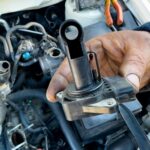Understanding your car’s performance goes beyond the basics like RPM and coolant temperature. A Sensor Obd2 kit allows you to tap into a wealth of additional data, providing a more comprehensive picture of your engine’s health and performance. This article explores how these kits work and the benefits they offer.
How Does a Sensor OBD2 Kit Work?
Similar to how your car’s onboard computer monitors standard parameters, a sensor OBD2 kit expands this capability by adding new sensors. These sensors communicate with your smartphone or tablet via a standard OBD2 dongle and a compatible app, displaying real-time data on custom gauges.
What Data Can You Monitor with Sensor OBD2?
The possibilities are extensive. You can monitor crucial parameters such as:
- Oil Pressure: Essential for engine health and lubrication.
- Oil Temperature: Critical for understanding engine operating conditions.
- Boost Pressure (Relative or Absolute): Crucial for turbocharged or supercharged engines.
- Boost Temperature: Helps monitor the efficiency of the intake system.
- Fuel Pressure: Indicates the health of the fuel pump and delivery system.
- Fuel Temperature: Affects fuel density and combustion efficiency.
- Fuel Ethanol Content: Important for vehicles using ethanol blends.
- Fuel Tank Level: Provides a precise fuel level reading.
- Mass Air Flow (MAF): Measures the amount of air entering the engine.
- Wideband Oxygen Sensor (Requires Standalone Controller): Measures air/fuel ratio for precise tuning.
- Custom Sensors: Virtually any sensor with a voltage or resistance output can be integrated.
Pre-Configured vs. DIY Sensor OBD2 Kits
Sensor OBD2 kits are available in two main configurations:
Pre-configured Kits: These kits come with all the necessary components, including an enclosure, sensors, wiring harnesses, and mounting adapters. A popular pre-configured option monitors oil pressure and temperature.
DIY Kits: For those who prefer a customized approach, DIY kits offer flexibility. They include analog and digital input/output pins, allowing you to connect a wider range of sensors and even control other vehicle functions. These kits require building your own wiring harness.
Compatibility and Requirements for Sensor OBD2
To determine if your car is compatible with a sensor OBD2 kit:
- Connect an OBD2 dongle (like an ELM327) to your car’s OBD2 port.
- Use a compatible app (like Torque Pro) on your smartphone.
- Navigate to Adapter Settings and check the OBD2 protocol.
Your car is likely compatible if it uses a CAN bus protocol at 500kbps with an 11-bit identifier.
All sensor OBD2 kits require:
- A compatible OBD2 dongle.
- A factory ECU supporting CAN bus at 500kbps and 11-bit identifier.
- 12V ignition switched power, ground, and OBD2 (CAN data) connections.
- A compatible app that allows custom parameter (PID) definition.
Logging Data with MazdaEdit PRO
For users of MazdaEdit PRO tuning software, some sensor OBD2 kits offer the ability to log custom parameters directly into the software.
A sensor OBD2 kit offers a powerful way to enhance your understanding of your car’s performance. Whether you choose a pre-configured kit for ease of use or a DIY kit for customization, accessing this additional data can empower you to make informed decisions about maintenance, performance tuning, and overall vehicle health.

